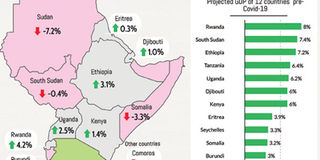Tanzania ‘to register fastest economic growth in East Africa

What you need to know:
- Despite the devastating impact of the Covid-19 pandemic, the African Development Bank predicts that Tanzania will register the highest economic growth among the 12 eastern African countries in 2020
Dar es Salaam. Tanzania’s economy is forecast to grow at 5.2 percent this year, while six Eastern African countries’ economies are projected to plunge into recession, blaming the trend on the Covid-19 pandemic, a new report shows.
The new projection by the African Development Bank (AfDB) is lower than the 6.4 percent it projected before the pandemic. Tanzania’s growth will beat 12 other Eastern African countries in 2020, according to the report. The government predicts the economy will grow by 5.5 percent this year, while the World Bank projects it to slow to 2.5 percent.
The six countries which are projected to go into recession in 2020 are Seychelles (-10.5), Sudan (-7.2), Burundi (-5.2), Somalia (-3.3), Comoros (-1.2) and South Sudan (-0.4).
The other six countries will grow economically - but doing so at arelatively lower rate than Tanzania.
The countries (with their growth rate percentages in brackets) are Rwanda (4.2), Ethiopia (3.1), Uganda (2.5), Kenya (1.4), Djibouti (1) and Eritrea (0.3).
“Despite the projected slowdown, real GDP growth in Tanzania will benefit from increased prices of gold, a major national export,” reads the report in part.
Gold is Tanzania’s leading foreign exchange earner after overtaking tourism this May, largely due to increased prices and production volumes.
Gold reached above $1,800 an ounce Wednesday for the first time since 2011, with the precious metal benefitting from its ‘safe haven’ status as the coronavirus outbreak triggered global economy fears.
Gold price was $1,257.35 in May 2019. The price surge partly contributed to making gold Tanzania’s leading foreign exchange earner, overtaking tourism which has been hit hard by the Covid-19 global pandemic.
Going by the Bank of Tanzania’s latest report, gold export earnings increased by 46.8 percent, to $2.5 billion (about Sh5.8 trillion) in the year to May 31, 2020.
Tourism earnings went down from $2.5 billion (Sh5.8 trillion) to $2.3 billion (Sh5.3 trillion) in the same period.
Real GDP growth, the report adds, would also benefit from reduced oil prices.
The Finance and Planning minister, Dr Philip Mpango, is on record as saying that Tanzania - which registered the first case of the Covid-19 in mid-March - was less hit by the pandemic because of the measures it took to cushion the economy.
While other countries imposed partial or total lockdowns, Tanzania did not do so in hopes of protecting the people, a majority of whom are “hand-to-mouth” cases.
The swift and massive shock of the coronavirus pandemic and shutdown measures to contain it are reported to have devastated economies of many countries across the globe.
At the regional level, the GDP growth projection has taken a hit in the face of the pandemic, with East Africa’s GDP projected to grow at 1.2 percent: far below the earlier projection of 5.1 percent.
The region’s economic growth remains robust amid emerging challenges - and until the Covid-19 outbreak, whose first cases were confirmed in late December last year, peters out.
Three East African countries - namely Tanzania, Ethiopia and Rwanda - are among the six African countries in the top-10 fastest-growing economies in the world.
The region’s real GDP growth was 5.2 percent in 2018 - but slowed down to 5 percent in 2019.
The estimated slowdown in 2019 was mainly a result of adverse weather conditions and fiscal consolidation that constrained growth in public sector infrastructure projects.
Multiple political and socio-economic policy interventions are necessary to harness East Africa’s growth prospects and mitigate the underlying external and domestic risks, says the report.
The basket of measures include a bold and coordinated response to the crisis; consolidating peace and stability; accelerating structural transformation, and strengthening macroeconomic policy coordination.
Other interventions may include diversifying the development financing sources; deepening regional integration, and developing skills for workforces of the future.
“A decisive and coordinated response is necessary to contain the spread of Covid-19, and mitigate its health and socio-economic effects,” reads the report in part.




